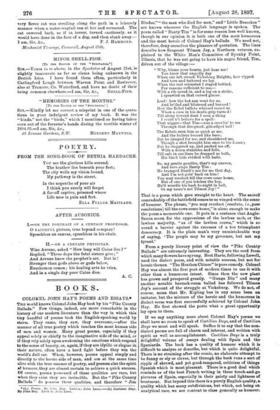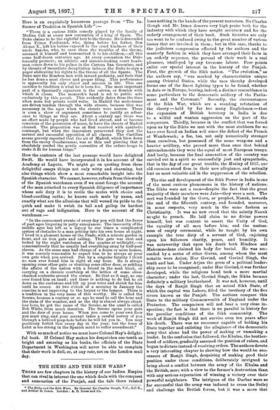BOOKS.
COLONEL JOHN HAY'S POEMS AND ESSAYS.* THE world knows Colonel John Hay beet by his "Pike County Ballads." Few things, indeed, are more remarkable in the history of our modern literature than the way in which this tiny handful of poems took the English-speaking world by storm. They came, they saw, they overcame,—after the manner of all true poetry which touches the most human side of men and women. Many great poems, especially if they appeal solely or chiefly to the imaginative side of the mind, or if they rely solely upon awakening the emotions which respond to the sense of beauty, or, again, if they are idyllic or elegiac in their nature, often have a hard fight before they win the world's dull ear. When, however, poems appeal simply and directly to the heroic side of man, and are at the same time alive with the true essence of poetry, and possess also the spirit of humour, they are almost certain to achieve a quick success. Of course, poems possessed of these qualities are rare, but when they exist they are invincible. But the "Pike Comity Ballads" do possess these qualities, and therefore " Jim • (1.) Poems. By John Hay. Londan: John Lane.—(2.) Castslian Days. Hy John Hay. Loud.n: John Lane.
Bludao," " the man who died for men," and" Little Breeches" are known wherever the English language is spoken. The poem called " Banty Tim " is for some reason less well known, though in our opinion it is both one of the most humorous and the most heroic of Colonel Hay's ballads. We need not, therefore, deny ourselves the pleasure of quotation. The lines describe how Sergeant Tilmon Joy, a Northern veteran, ex- plained to the White Man's Committee of Spunky Point, Illinois, that he was not going to have his negro friend, Tim, driven out of the village :—
" Why, blame your hearts, jest hear me!
You know that ungodly day When our left struck Vicksburg Heights, how ripped: And torn and tattered we lay.
When the rest retreated I stayed behind,
Fur reasons sufficient to me,—
With a rib caved in, and a leg on a strike,
I sprawled on that cursed glacee.
Lord! how the hot sun went for us, And br'iled and blistered and burned ! How the Rebel bullets whizzed round us When a cuss in his death-grip turned ! Till along toward dusk I seen a thing I could n't believe for a spell : That nigger—that Tim—was a crawlin' to me Through that fire-proof, gilt-edged hell !
The Rebels seen him as quick as me, And the bullets buzzed like bees ; But he jumped for me, and shouldered me, Though a shot brought him once to his kaees But be staggered up, and packed me off, With a dozen stumbles and falls, Till safe in our lines he dropped us both, His black hide riddled with balls.
So, my gentle gazelles, thar's my answer, And here stays Banty Tim : He trumped Death's ace for me that day, And I'm not goin' back on him!
You may rezoloot till the cows come home, But ef one of you tetches the boy, He'll wrastle his hash to-night in hell, Or my name's not Tilmon Joy'"
That is a poem which goes straight to the heart. The sacred: comradeship of the battlefield comes tons winged with the sense
of humour. The phrase, "you may rezoloot [resolute, i.e.,paas- resolutions] till the cows come home," is alone enough to make
the poem a memorable one. It puts in a sentence that Anglo- Saxon scorn for the oppressions of the lawless mob, or the lawless majority, "as of the lawless crown," which is so sound a barrier against the excesses of a too triumphant
democracy. It is the plain man's very unmistakeable way of saying, The people may be my governor, but not my
tyrant.'
From a purely literary point of view the "Pike County Ballads" are extremely interesting. They are the seed from which many flowers have sprung. Bret Harte, following Lowell, used the dialect poem, and with notable success, but not for- heroic themes. "The Heathen Chime" is pure comedy. Colonel Hay was almost the first poet of modern times to use it with other than a humorous intent. Since then the new plant has grown and prospered greatly. "Gongs, Din" and many another notable barrack-room ballad has followed Tilmon Joy's account of the struggle at Vicksburg. We do not, of course, mean that Mr. Kipling has in any sense been an imitator, but the mixture of the heroic and the humorous in dialect verse was first successfully achieved by Colonel John. Hay. He first showed the poets what a great opportunity lay open to them.
If we say anything more about Colonel Hay's poems we shall have no room to speak of Castilian Days, and of Castilian. Days we must and will speak. Suffice it to say that the non.
dialect poems are full of charm and interest, and written with spirit as well as accomplishment. Castilian Days is a truly delightful volume of essays dealing with Spain and the Spaniards. The book has a quality of humour which it is difficult to analyse or describe, but which is quite delightful.. There is no straining after the comic, no elaborate attempt to be funny or sly or clever, but through the book runs a sort of ripple of shrewd, and yet good-tempered, criticism of things Spanish which is moat pleasant. There is a good deal which reminds us of the best French writing in these touch-and-go pictures of Spain, especially in their gaiety and lightness of treatment. But beyond this there is a purely English quality, a. quality which has many subdivisions, but which, not being an.
analytical race, we are content to class generally as humour.
Here is an exquisitely humorous passage from "The In- fluence of Tradition in Spanish Life "
There is a curious little comedy played by the family of Medina Celi at every new coronation of a king of Spain. The Duke claims to be the rightful heir to the throne. He is descended from Prince Ferdinand, who, dying before his father, Don Alonso X., left his babies exposed to the cruel kindness of their uncle Sancho, who, to save them the troubles of the throne, assumed it himself and transmitted it to his children,—all this; some half-dozen centuries ago. At every coronation the Duke formally protests ; an athletic and sinister-looking court heads- man comes down to his palace in the Carrera San Geronimo, and by threats of immediate decapitation induces the Duke to sign a paper abdicating his rights to the throne of all the Spains. The Duke eats the Bourbon leek with inward profanity, and feels that he has done a most clever and proper thing. This performance is apparently his only object and mission in life. This one sacrifice to tradition is what he is born for. The most important part of a Spaniard's signature is the viatica, or flourish with which it closes. The monarch's hand is set to public acts exclusively by this parafe. This evidently dates from the time when none but priests could write. In Madrid the mule-teams are driven tandem through the wide streets, because this was necessary in the ages when the streets were narrow. There is even a show of argument sometimes to justify an adher- ence to things as they are. About a century ago there was an effort made by people who had lived abroad, and so become conscious of the possession of noses, to have the streets of Madrid cleaned. The proposition was at first received with apathetic contempt, but when the innovators persevered they met the earnest and successful opposition of all classes. The Castilian savans gravely reported that the air of Madrid, which blew down from the snowy Guadarramas, was so thin and piercing that it absolutely needed the gentle corrective of the ordure-heaps to make it fit for human lungs."
How the contents of the last passage would have delighted Swift. He would have incorporated it in his account of the Academy at Laputa. We might go on quoting from these delightful essays things not only witty and charming, but also things which show a most remarkable insight into the Spanish character. We cannot, however, refrain from this study of the Spanish watchman even if we must forego the account of the man attached to every Spanish diligence of importance whose sole duty it is to revile the mules with choice and blood-curdling oaths ; he knows each mule by name, and exactly what are the allusions that will wound its pride to the quick and make it swish its tail and gallop its hardest out of rage and indignation. Here is the account of the watchman :—
" In the commonest events of every day you will find the flavor of past ages lingering in petty annoyances. The insecurity of the middle ages has left as a legacy to our times a complicated system of obstacles to a man getting into his own house at night. I lived in a pleasant house on the Prado, with a minute garden in front, and an iron gate and railing. This gate was shut and locked by the night watchman of the quarter at midnight,—so conscientiously that he usually had everything snug by half-past eleven. As the same man had charge of a dozen or more houses, it was scarcely reasonable to expect him to be always at your own gate when you arrived. But by a singular fatality I think no man ever found him in sight at any hour. He is always opening some other gate or shutting some other door, or settling the affairs of the nation with a friend in the next block, or carrying on a chronic courtship at the lattice of some olive- cheeked soubrette around the corner. Be that as it may, no one
• ever found him on hand ; and there is nothing to do but to sit down on the curbstone and lift up your voice and shriek for him until he comes. At two o'clock of a morning in January the exercise is not improving to the larynx or the temper. There is a tradition in the very name of this worthy. He is called the Serene, because a century or so ago he used to call the hour and the state of the weather, and as the sky is almost always cloud- less here, he got the name of the Sereno, as the quail is called Bob White, from much iteration. The Sereno opens your gate and the door of your house. When you come to your own floor you must ring, and your servant takes a careful survey of you through a latticed peep-hole before he will let you in. You may positively forbid this every day in the year, but the force of habit is too strong in the Spanish mind to suffer amendment."
With so much of notice we must leave Colonel Hay's delight- ful book. If Colonel Hay makes his despatches one-tenth as bright and amusing as his books, the officials of the State Department in Washington will never be able to complain that their work is dull, or, at any rate, not on the London mail day.



































 Previous page
Previous page